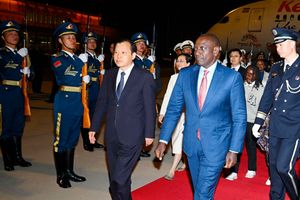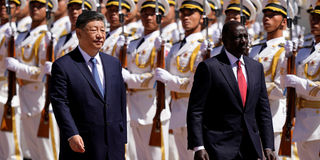
Chinese President Xi Jinping and Kenyan President William Ruto attend a welcome ceremony at The Great Hall of The People on April 24, 2025 in Beijing, China.
President William Ruto was due to meet his Chinese counterpart, Xi Jinping, on Thursday, the icing on the cake of the state visit.
And while the trip has been largely smooth, there have been a few bumps along the way.
Here are the sideshows:
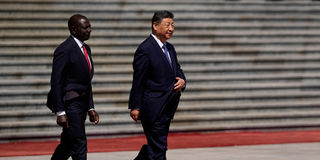
Chinese President Xi Jinping and Kenyan President William Ruto attend a welcome ceremony at The Great Hall of The People on April 24, 2025, in Beijing, China.
Ruto wanders into diplomatic hot zone with EA peers as he explains bilateral trade deal
At an event with the Kenyan diaspora to explain Nairobi's desire for a free trade agreement with China, President Ruto chose a neighbourhood example.
Kenya, he said, unlike its neighbours Tanzania and Uganda, paid higher tariffs to export goods to China, which meant its neighbours sold more.
"The difference between Kenya and our neighbours is that Kenya is in the Middle Income category. Our neighbours, Tanzania, Uganda and others are in the least developed countries (category), he explained. "We are categorised higher than them, so while they export duty-free, Kenya exports with duty."
The fact is Tanzania and Uganda don't need a free trade agreement (FTA), currently, to avoid tariffs in China.
Kenya needs the agreement.
The framing of Tanzania and Uganda as the least developed group was also a fact, just that it came out raw, and some Tanzanians were already yelling online about it.
Tanzania, like Kenya, is expected to be promoted from the group to lower-middle-income status next year, according to an earlier schedule.
AI solves the language barrier, but some translations are torturous
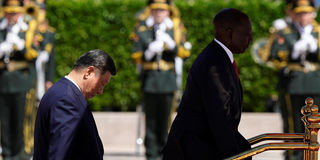
Chinese President Xi Jinping and Kenyan President William Ruto attend a welcome ceremony at The Great Hall of The People on April 24, 2025 in Beijing, China.
Artificial intelligence can be good or bad, depending on how you use it.
The government delegation in China has found solace in some AI language apps to help them get around the city, where English is not widely spoken.
You simply speak your request into it, and it translates it back to the listener in voice and text.
If the listener needs further clarification, they can type in Chinese, and it translates into English script.
Problem solved?
Not quite.
Take the example of asking someone to "kill hunger", which is the metaphorical way of saying you want to eat. AI, still in its infancy, can't read figurative language, so it translates literally.
In Beijing, the Chinese man heard something like "torture hunger". It forces you to lower your poetic skills.
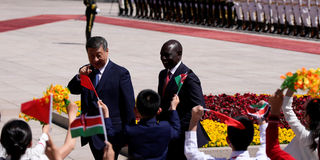
Chinese President Xi Jinping and Kenyan President William Ruto attend a welcome ceremony at The Great Hall of The People on April 24, 2025 in Beijing, China.
Internet firewalls frustrate social media users
Chinese digital platforms are widespread, benefiting from a population in a country where, according to official figures, extreme poverty was eradicated in 2023.
But it's not social media that people in Nairobi use most: X, Facebook, WhatsApp, etc.
Some government officials, who initially arrived without virtual private networks installed on their devices, spent the first few days struggling to get connected.
And it didn't help that Internet firewalls were often in place, slowing speeds to frustrating levels.
Unpredictable presidential schedule keeps teams on their toes
By their very nature, presidential schedules can be unpredictable.
During President William Ruto's state visit to Beijing, some events were moved at the 11th hour or cancelled to make way for alternative meetings.
This has meant that protocol officers have had to spend long nights reworking speeches, changing dates, adjusting paragraphs of MoUs or staying awake altogether to ensure that the next meeting goes off without a hitch.
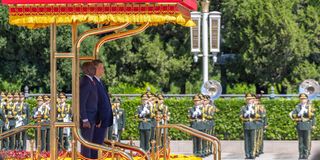
Chinese President Xi Jinping and Kenyan President William Ruto attend a welcome ceremony at The Great Hall of The People on April 24, 2025 in Beijing, China.
Ritual recitation of 'One China' policy
President Ruto couldn't have ended this visit without reaffirming a foreign policy that Kenyan leaders have stood by for decades: the One China policy.
It is something that President Ruto said when he met Premier Li Qiang and referred to in a speech at Peking University.
This refers to China's global campaign for Beijing to be the sole capital of China, even though its territories, the mainland and Taiwan, have different political systems.
Kenya doesn't have this problem.
In fact, in 1971, it was one of the UN members that voted for the People's Republic of China (China's official name) to replace the Republic of China (Taiwan) as a permanent member of the UN Security Council.
Nairobi has continued with this principle and almost every year reminds Beijing that it recognises only one China.

